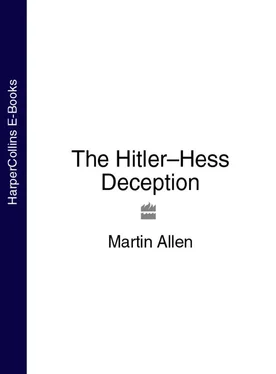1 ...8 9 10 12 13 14 ...21 In 1920, at the age of seventeen, Albrecht enrolled to study under his father at Munich University, together with his close friend ‘Rudi’ Hess. Both were recognised as star pupils. But in 1923 Hess’s participation in the abortive Bürgerbräukeller Putsch took him away from academia to a year’s enforced seclusion with Hitler at Landsberg prison. Here he was visited and continued to be tutored by his mentor, Karl Haushofer. Albrecht too was a visitor to Hess and his fellow prisoner, the enigmatic man nicknamed ‘Wolf’.
In 1924, while Hess was still assisting Hitler with Mein Kampf in prison, Albrecht Haushofer graduated from Munich University with a doctorate in geography. In a few weeks, after a quiet word from Haushofer senior to his old-boy network, Albrecht was appointed as personal assistant to the renowned Dr Penck of Berlin, a world-class geographer.
Within eighteen months Albrecht applied for, and was appointed to, the post of Secretary-General of Germany’s prestigious Society for Geography, a Berlin-based foundation with a worldwide reputation. A year later he became editor of the prestigious Periodical of the Society of Geography (a similar publication to the National Geographic ). With this position came a sumptuous apartment on the top floor of the society’s central Berlin premises on Wilhelmstrasse.
Throughout the next fifteen years, as Secretary-General of the Society for Geography, Albrecht Haushofer travelled the world – to South America and the Andes one year, India and the Himalayas the next; home again for a season’s lecturing at Berlin University, then off again, to China and Japan, Egypt or the Sudan. All this time he was making friends who would be invaluable to him in the 1930s, when the Nazi hierarchy suddenly realised that this quiet man had important political contacts in virtually every nation in the world. Thus, by the time Rudolf Hess approached Albrecht in 1931 to advise him on international matters, he found a man steeped in the art of diplomacy and foreign affairs.
Despite Albrecht’s range of contacts across the world, the country that he – and also Hitler and Hess – had a predominant interest in cultivating was not an ocean or a continent away. It was a rather staid, old-fashioned, class-structured little nation a mere 350 miles from Germany’s western frontiers. It did however possess one of world’s great empires, and was one of the world’s major powers. Albrecht Haushofer was Germany’s foremost expert on Britain.
Haushofer was fascinated by Britain and her people. During the 1920s he had visited Britain extensively, becoming near-fluent in English and developing a wide range of important personal acquaintances that allowed him to mix in the highest political and social circles. His initial entrée into British society had been through his old friend Patrick Roberts, who introduced him to many of his friends and colleagues, young men who in the early 1920s were junior Foreign Office minions, young aristocrats and political acquaintances, but who by the latter 1930s would be Britain’s top diplomats, civil servants and politicians.
Slightly older than Albrecht Haushofer, Patrick Roberts had joined the Foreign Office, where he had an interesting, if slightly curious, career. His postings were numerous – ranging from Berlin, Warsaw and Addis Ababa through to Belgrade and Athens, ever hotbeds of Balkan discontent – with hardly ever enough time for him to become familiar with a place before he was transferred yet again. In 1937, Roberts would meet with a sudden and untimely end when he was killed in a bizarre road accident in a dusty, dead-end Greek village north of Athens. The question of whether his career was connected in some way to British Intelligence has remained unanswered ever since.
Among the men Roberts had introduced to his young German friend Albrecht Haushofer was Sir Owen O’Malley, who had subsequently risen through the Foreign Office to become Ambassador in Budapest and Lisbon. At the end of the Second World War, O’Malley panicked when an American newspaper published an account of how newly discovered German documents revealed details of his friendship with Adolf Hitler’s private adviser on foreign affairs, and that he, together with other ‘British subjects both inside and outside the Government Service’ was being referred to at the Nuremberg trials in connection with the Rudolf Hess case. Keen to unburden his soul and protect his career, a flustered O’Malley swiftly wrote to a colleague at the Foreign Office: ‘I knew Haushofer quite well. He was originally introduced to me many years ago by the late Patrick Roberts, who had got to know both the Haushofers and Hess first during the period when he was learning German in Germany and secondly during his period when he was at the British Embassy in Berlin.’
Keen to distance himself from his former friend, and apparently not at all loath to drop someone else in the mire, O’Malley went on: ‘Haushofer was a great fat smelly German with the usual German rather academic outlook on politics. I liked him although [being rather overweight, he] broke two of my more fragile Hepplewhite chairs by merely sitting on them. He used to come and spend the weekend at my house in the country round about the years 1932–1935 during the period he had been in contact with Lord Clydesdale and, I think also Lord Lothian.’ 23
Intriguingly, Lord Lothian was the British Ambassador to Washington in the late 1930s whose sudden death in 1940 resulted in the former Foreign Secretary Lord Halifax’s appointment to his post. Lord Clydesdale was the man Rudolf Hess allegedly flew to Scotland to see in May 1941, for he was none other than Douglas Douglas-Hamilton, who in 1940 became the Duke of Hamilton.
Thus Albrecht Haushofer’s connection to the Roberts family was firmly entrenched. His friend Patrick had introduced him to all his friends and colleagues, up-and-coming young men who by the late 1930s would be Britain’s top civil servants and politicians, and who in 1940 would be vital contacts to Haushofer in assisting the German leadership’s elusive search for peace.
No less important was Patrick Roberts’ mother Violet. The next time she made an appearance in Albrecht Haushofer’s life, as an elderly widow in 1940, she would be the dab of honey at the centre of an intricately spun spider’s web of intrigue that would lure Haushofer, Hess and Hitler to destruction; for there was an aspect to the Roberts family of which both Karl and Albrecht Haushofer remained totally ignorant – a fortuitous coincidence that British Intelligence would use to doom Hitler’s hopes of winning the Second World War.
By the mid-1930s Albrecht Haushofer’s range of aristocratic and political contacts had completely opened up British society to him, and he had dined and smoked after-dinner cigars with such pillars of the British establishment as Stanley Baldwin, Ramsay MacDonald, Neville Chamberlain, Lord Dunglass (Alec Douglas-Home), Sir John Simon, Anthony Eden, Lord Halifax and, perhaps most intriguingly of all, Winston Churchill. Haushofer’s contacts were a veritable panoply of Britain’s high and mighty, and thus it is not surprising that when the Nazis took power in 1933 both Hess and Hitler looked upon him as a trusted friend who could confidentially advise them on foreign affairs, particularly with regard to the British, and embraced him as a gift sent down from on high.
Despite Albrecht’s rise to eminence in German academic circles, and his abilities as a geographer and expert on European politics, he himself carried out little political activity on behalf of the Nazi regime, which he would eventually consider evil. Rudolf Hess and Adolf Hitler may have wanted to make use of his considerable expertise on foreign affairs and international politics, but that does not explain why Albrecht went along with them. At any point after 1933 he could easily have packed his bags and decamped to the democratic West, fled to the bright lights of America, where he would undoubtedly have been welcomed by virtue of his academic talents. Despite the fact that, even with Hess’s support, his part-Jewish ancestry prevented him from ever attaining his boyhood dream of becoming Germany’s Foreign Minister, in the 1930s he was largely an advocate of National Socialist foreign policy on the European stage – a reserved supporter, using his expertise to further Germany’s position as a major European power.
Читать дальше












